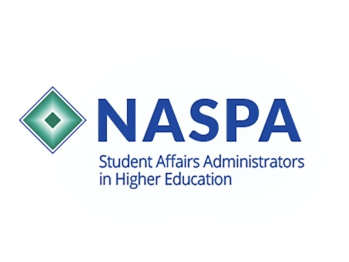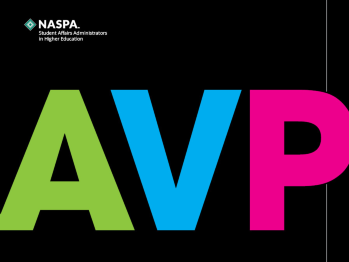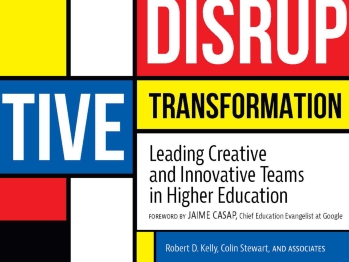
Evolving to Excellence in the AVP Role
Virtual Short Courses Career and Workforce Development Policy and Advocacy Supporting the Profession Equity, Inclusion and Social Justice AVP or "Number Two" Senior Level
April 5 - April 15, 2021 Various Times
This AVP-exclusive short course is designed to promote the development of AVP competencies, attitudes, practices, and habits necessary to achieve excellence in the AVP role. Over an eleven-day period, participants will engage with the course instructors, one another, and the course content through a blend of live engagement and on-demand, asynchronous opportunities.
Participation in this AVP-exclusive short course is limited to professionals currently serving in an AVP (or equivalent) role. All participants must report to the highest-ranking student affairs/student success/student life/campus life officer on campus and have substantial responsibility for divisional functions.
Presented By

About
Designed to promote the development of AVP competencies, attitudes, practices, and habits necessary to achieve excellence in the AVP role, this short course is appropriate for all AVPs (and the equivalent). It is not an introduction to the AVP role nor is it focused on what’s needed to transition from the AVP to VPSA role. Instead, it is an instructor-led, deep exploration of what it takes to become and continue to be the best AVP possible.
The diverse instructor team, comprised of accomplished AVPs and VPSAs from a variety of institutional types, brings to the course deep content expertise regarding strategies for success in the AVP position. Course modules will address the following topics: sustaining passion for the work; equity and inclusion through a leadership lens; supervision; navigating from “the middle”; leading functions without deep expertise; managing resources; law and policy; and doing the work of the AVP in service of self, students, and the institution. Over a two-week period, participants will meet four times with course instructors. Between these staggered live sessions, participants will engage asynchronously with recorded video content, readings, other assignments, and one another via course discussion forums. Several networking opportunities will also offered. Participants can expect to spend 11 hours in live sessions with instructors and approximately 8 hours viewing recorded content and completing related assignments and readings.
Course Modules
Module I: Don’t Just “Be” the AVP. “Do” the AVP”
The AVP/“number two” serves in a critical role in providing support through the supervision of a significant number of departments or functions across a division while also providing support to the vice president as a leader within the division. The AVP role can be challenging in balancing the needs of departments within the division and the needs of the division within the context of the institution. Each day calls upon AVPs to quickly and effectively navigate and address student and staff related issues. Exploring how one effectively leverages one’s respective strengths to be an outstanding AVP and how one chooses to lean into one’s role is critical self-work as an AVP. Building one's competencies and habits to do this work successfully needs to be both intentional and on-going. Participants will cultivate an understanding of the AVP competencies within their day -to-day work and experience through storytelling how to effectively navigate the ever-changing opportunities to do this work. A self-reflection exercise will be provided and expected to be completed for the face-to-face workshop.
Module Learning Outcomes
-
Deepen understanding of the AVP competencies as they relate to your role for the departments and or functions you supervise and for the division.
-
Learn strategies to advance effectiveness in your own AVP role work across the division and the institution.
-
Reflect on your own strengths and areas of growth to advance your leadership role.
Module Instructors
- Kimberly Lowry, Vice President, Student Success and Instruction, Lone Star College–Houston North
- Daniel Maxwell, Associate Vice Chancellor for Student Affairs, UH System and Associate Vice President for Student Affairs, University of Houston
Module II: Beyond the Tip of the Iceberg: Student Affairs Law and Policy from a DEI Lens
As student affairs practitioners serving in the AVP role, each day calls upon an ability to quickly and effectively navigate and address student related policy and compliance matters. As university leaders, we provide insight, forward vision, and council on decisions grounded in policy and compliance for not only for student affairs but for the campus community at large. These responsibilities are at times carried out following a highly charged situation with demands for quick action and consequences that may be highly visible with lasting implications. Further consideration should include how these efforts intersect with university diversity, equity and inclusion efforts. The multi-faceted and multi-varied elements of this decision making combined with the myriad of stakeholders can oftentimes stall or be viewed as negatively impacting the university’s ability to advance DEI and campus climate. Through this module participants will explore how to view policy and compliance decision-making through the lens of diversity, equity and inclusion. No two institutions are the same and we work in a dynamic environment that grows more diverse with every class. Participants use these contexts and others to frame various approaches AVPs can use to address a range of laws and policies that are either longstanding and burgeoning within the field of student affairs and/or that impact the student experience.
Module Learning Outcomes
-
AVPs will be able to identify the formal and informal ways we engage with law and policy in our everyday practice.
-
AVPs will be able to identify internal and external campus partners with whom they can engage when examining application and implications of laws and policies.
-
AVPs will be able to identify and contextualize how action or implementation of a law/policy/procedure could have a perceived or real impact on the campus or greater community as it relates to diversity, equity, and inclusion or campus climate.
Module Instructors
- Sharron Evans, Associate Vice President for Student Affairs & Dean of Students, Iowa State University
- Carol Sumner, Vice President and Chief Diversity Officer, Texas Tech University
Module III: Balancing Authenticity and Advocacy in Leading JEDI Work
The role of the AVP is a complex one, and rarely more so than when it comes to leading divisional and institutional change in matters of justice, equity, diversity, and inclusion (JEDI). Through a panel discussion, reflection, and an interactive synchronous session and activities, participants will explore, contemplate, and make meaning of identity, authenticity, and leadership; navigating politics and environments; and championing initiatives for JEDI integration.
Module Learning Outcomes
-
Explore identity-related dynamics of navigating campus politics, conflict, and authentic presentations of self
-
Deepen understanding of the role-related complexities of advocating for students and staff in an era of heightened campus activism
-
Learn strategies to advance structural change and embed JEDI work across all divisional functional areas
-
Reflect on your own strengths and areas of growth to advance justice
Module Instructors
- Daniel Maxwell, Associate Vice Chancellor for Student Affairs, UH System and Associate Vice President for Student Affairs, University of Houston
- Monica Nixon, Assistant Vice President for Equity, Inclusion, and Social Justice, NASPA
Module IV: Nimble Leadership and Diverse Expertise: Acknowledging and Handling What You Don’t Know
As AVPs, we are often called upon to supervise multiple functional areas including those that we have little to no background in. This requires us to quickly develop a level of content knowledge or expertise to be effective in our roles and truly become the ideal generalist. Using the NASPA AVP competencies as a framework, this session will help participants to reflect on the various ways that they have utilized their strengths and understanding of what they do not know so that they can be the most effective in their current and future roles.
Module Learning Outcomes
-
Reflect and utilize one’s own strengths and gain comfort with understanding of what one may not know
-
Develop and acknowledge the importance of empowering direct reports
-
Consider how one leads with humility and confidence
-
Cultivate one’s own support team internal and external to your institution as an AVP
-
Determine how to create opportunities for one’s team members to thrive and advance
Module Instructors
- Jacob Diaz, Regional Assistant Vice Chancellor of Student Success and Dean of Students, University of South Florida, St. Petersburg Campus
- Romando Nash, Associate Vice President for Student Life Services, University of Nevada, Reno
Module V: Leading the Team You Have: Advanced Supervision Techniques for the Student Affairs AVP
In this module, you will have the opportunity to build on your leadership skills to consider your team and how you can create conditions for their greatest success. This session includes content about how to look deeply at your team and lead them to individually and collectively be multiculturally competent to support students. Additionally, the instructors will provide concepts and tangible tools so you can utilize the lenses of potential, performance, and identity. The session’s content and reflection points will help advance your supervision techniques, so you can better support your team to lead their work in supporting student success.
Module Learning Outcomes
-
Participants will develop a framework for planning growth-focused supervision
-
Participants will consider how to challenge and support their team to increase multicultural competence
-
Participants will be introduced to a tool for analyzing their team’s performance and potential
-
Participants will reflect on their habits as a supervisor
-
Participants will have more confidence in their role as a supervisor of their current team
Module Instructors
- Kathryn Kay Coquemont, Associate Vice President for Student Success, Salt Lake Community College
- Sara Reed, Associate Vice President, People and Workplace Culture, Salt Lake Community College
Module VI: How to Leverage Your Resources: High Resource Utilization Is Not an Indication of Good Resource Management
The role of the AVP is to leverage strategic resources across their departments and divisions. These include financial, human, technological, space, and time resources. With stagnant and decreasing enrollments and the rise of technology, we need to be tactical stewards and think creatively in meeting various demands with limited resources to propel our divisions forward. Many times the AVP is one of the most stressful positions, but navigating resources across your institution will enable you to become more successful professionals. As a leader you must find the balance in supporting those you supervise and helping your vice president and university leadership achieve strategic goals. This session will provide specific information and helpful tools on how these resources can intersect to create a competitive advantage for your campus/unit.
Module Learning Outcomes
-
Apply a broad understanding of resource accountability to current issues and trends in higher education.
-
Develop a strategic perspective of resource management and an understanding of how budget allocations, reallocations, and cuts occur and impact operations and planning processes.
-
Understand the importance of aligning resources to effectively schedule, plan, and manage your team.
Module Instructors
- Brandon Griggs, Assistant Vice President and Dean of Student Affairs, Texas A&M University Central Texas
- Lisa Nagy, Vice President for Student Affairs, The University of Texas at Arlington
Module VII: “Stuck in the Middle with You” – Navigating the Middle as an AVP
The role of the AVP is one that constantly oscillates between leading and following. AVPs are in very unique positions as leaders of large and complex teams and groups, and they also often serve in “behind the scenes” institutional leadership roles or as the “number two” to their vice president for student affairs. Being “in the middle” can be stressful, but a successful AVP can make navigating from the middle a key role providing connection and alignment for both institutional leaders as well as the teams they manage. Managing from the middle also offers the opportunity to provide a compass for the division. This session will help participants explore how to successfully navigate from the middle to effectively lead and serve their students and their institutions. Through reflection activities, participants will be provided an opportunity to assess the areas of success and opportunities they have to navigate from the middle.
Module Learning Outcomes
-
Participants will understand the value of emotional intelligence and identity consciousness
-
Participants will have an opportunity to reflect on developing a community of practice and future goals
-
Participants will understand the theoretical perspectives on managing from the middle
Module Instructors
- Shruti Desai, Associate Vice President of Student Affairs for Campus Life, Duke University
- Smita Ruzicka, Dean of Student Life, Johns Hopkins University
Module VIII: Sustaining Success in the AVP Role
A few years into the position, AVPs are comfortable with the new role, understand the ebbs and flows of the position, and are making it their own. This can be a time for AVPs to blossom in the position and in their own personal development. This module will explore how AVPs can lean into a variety of strategies to sustain success in the AVP role. Career stage theory and motivation theory will be used as a framework for understanding sustained success. Particular attention will be paid to the ways that reflection, professional development experiences, and utilizing strengths are strategies for maintaining motivation. The live portion of the module will feature a panel of experienced AVPs sharing their personal success strategies.
Module Learning Outcomes
-
Participants will be introduced to career stage and motivation theory to inform common challenges associated with longevity
-
Participants will explore ways to grow and develop through professional opportunities
-
Participants will reflect on ways to engage and stay challenged in the positions
-
Participants will hear the voices of experienced AVPs and strategies they use to sustain success
Module Instructor
Cynthia Hernandez, Vice President for Student Affairs, Texas State University
Schedule
March 29 - April 4
April 5
April 6 - April 7
April 8
April 9 - April 11
April 12
April 13 - April 14
April 15
Asynchronous preparation for first live day of course including review of video components of Modules I and II. Estimated time required: 2 hours
2:00 PM - 2:30 PM
Course Overview and Introductions
2:30 PM - 3:00 PM
Live Component of Module I: Don’t Just “Be” the AVP. “Do” the AVP.”
3:00 PM - 3:15 PM
Break
3:15 PM - 3:45 PM
Live Component of Module II: Beyond the Tip of the Iceberg: Student Affairs Law and Policy from a DEI Lens
3:45 PM - 4:30 PM
Structured Networking Session
Asynchronous preparation for second live day of course including review of video components of Modules III and IV. Estimated time required: 2 hours
2:00 PM - 2:15 PM
Introduction of Day 2
2:15 PM - 2:45 PM
Live Component of Module III: Balancing Authenticity and Advocacy in Leading JEDI Work
2:45 PM - 2:50 PM
Transition Break
2:50 PM - 3:20 PM
Live Component of Module IV: Nimble Leadership and Diverse Expertise: Acknowledging and Handling What You Don’t Know
3:20 AM - 3:35 AM
Break
3:35 PM - 4:15 PM
“Office Hours” with Instructors for Modules I - IV
4:15 PM - 5:00 PM
Topic-specific Roundtable Discussions
Asynchronous preparation for third live day of course including review of video components of Modules V and VI. Estimated time required: 2 hours.
2:00 PM - 2:05 PM
Introduction of Day 3
2:05 PM - 2:35 PM
Live Component of Module V: Leading the Team You Have: Advanced Supervision Techniques for the Student Affairs AVP
2:35 PM - 2:40 PM
Transition Break
2:40 PM - 3:10 PM
Live Component of Module VI: How to Leverage Your Resources: High Resource Utilization Is Not an Indication of Good Resource Management
3:10 PM - 3:25 PM
Break
3:25 PM - 4:15 PM
Benefiting from the Collective Wisdom of the Group
Asynchronous preparation for fourth and final live day of course including review of video components of Modules VII and VIII. Estimated time required: 2 hours
2:00 PM - 2:05 PM
Introduction of Day 4
2:05 AM - 2:35 AM
Live Component of Module VII: “Stuck in the Middle with You” – Navigating the Middle as an AVP
2:35 PM - 2:40 PM
Transition Break
2:40 PM - 3:10 PM
Live Component of Module VIII: Sustaining Success in the AVP Role
3:10 PM - 3:25 PM
Break
3:25 PM - 4:00 PM
“Office Hours” with Instructors for Modules V - VIII
4:00 PM - 4:30 PM
Course Wrap-Up
Speakers

Sue Macchiarella's lifelong international experiences include living and working globally. She spent a great portion of her life in Asia, Europe and Africa--often traveling to and working in locations seldom visited by outsiders. Sue has worked intimately with travel safety and security for many years in both public and private organizations. Since starting at Embry-Riddle Aeronautical University (ERAU) in November 2011, she increased student participation in globalization programs by over 100%. Her programs have won international awards to include the 2013 Heiskell Award Special Recognition: Internationalizing the Professions, the 2016 Bronze Award, along with her Greek partner Angeliki Vaxevanaki, owner of Get Lost, from the Greek Ministry of Tourism for Innovative Programming and Strategic Partnerships and, most recently, the 2019 Senator Paul Simon Award for Comprehensive Internationalization under NAFSA, the 2020 PIEoneer Award for Real Life Learning and, most recently, the IIE Generation Study Abroad. She has presented on a variety of study abroad topics both in the United States and abroad, published an article on “Aviation Beyond Borders” in the EAIE (European Association of International Educators) magazine and contributed to other articles on international education. Sue enjoys consulting on program development and holds two master degrees: Human Resource Development and Public Administration. She is the Director of the Office of Global Engagement at Embry-Riddle Aeronautical University.

